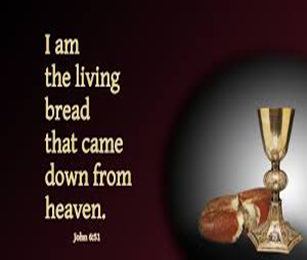Sunday 11th of August 2024 - Nineteenth Sunday in Ordinary Time
- brendanflaxman
- Aug 10, 2024
- 4 min read

1 Kings 19:4-8/ Psalm 33(34)/ Ephesians 4:30-5:2/ John 6:41-51
The news over the past few days has been dominated by the violence whipped up in various places in England. Violence that has brought hate, destruction and fear to the hearts of communities. It is not readily discernible as to where this hate originates but it is spread readily through social media by means of outrageous misinformation. An appalling criminal act of violence against the most vulnerable of people was hijacked for the purposes of seriously disrupting the normal state of society. A Christian society should be known for its love, compassion and kindness, there is no place for hate, indifference and harm in such a society.
The anger and hate seen on the faces of those involved in the recent violence is a frightening thing. It expresses itself in a passion and behaviour that is barely human. In extreme cases this anger results in violence against people, property, and anything vaguely representing authority and good order. The scenes we witness through the media and the conflict that people must endure around them are a result of outrageous and irrational behaviour. Anger will devastate people, communities and families, inflicting serious harm on individuals, property and society itself. Anger should have no place in a just and stable society and certainly not in the heart of a compassionate Christian community. Christianity, belief in Jesus, a willingness to be like Christ, should seek to promote love rather than destroy it, to extend the warmth of God’s compassion and forgiveness rather than the fire of hate. To speak in terms of kindness rather than shouting insult and violence. God does not treat us with hostility, and we should be imitators of God.
The reading from the letter to the church in Ephesus continues the teaching on what it is to be the Church, with Christ as its head, listing the obligations members have towards each other. It speaks to all down the ages and is as relevant today as it has been at any time. We become members of God’s church through baptism and being marked by the seal of confirmation. As members of the church founded by Jesus, we are encouraged to follow the basic principals set out in the letter. Never have grudges against others, never lose our temper or raise our voices to anyone, do not call each other names or allow any sort of spitefulness to develop. These are all things we have witnessed in news reports these last few days. The remedy is to live a Christian life, being friends with each other, kind and forgiving as readily as God forgives us through the actions of Christ. We cannot pick and choose who to be nice to, we have an obligation to treat others as God treats us all. We should seek to recognise Christ in those we meet. In the refugee, the migrant, the stranger, all those who are fleeing persecution, conflict, disasters of one kind or another, or severe economic deprivation.
In the gospel passage today we see the failure by his own people to recognise Christ for who he is, and who he was claiming to be. Their recognition was only skin deep and because they knew his father and mother, they could not accept what he was saying about coming down from heaven. We must look for Jesus in the other person, in the stranger, and yes, even in those who we might consider to be our enemy. God recognises us from deep within our being, from our soul, and we must try to do the same with those we meet.
Jesus is the living bread that comes down from heaven. We eat this living bread in the Eucharist, and it is the life of the world. Through this we can become more Christlike in our lives, and being more like Christ, we will become better at seeing him in others. We are all on a journey, a pilgrimage, through life. Faith in Christ and eating the flesh and blood he gives will sustain us on this journey. It will help us spread the love and forgiveness that God has offered to all through the life, death and resurrection of Jesus. The more we become like Christ, the more we live a Christ centred existence, the more love, peace, and tolerance there will be in the world.
Living a Christian life should mean that we are beacons shining brightly in the sometimes dark days we find ourselves living through. People should be drawn to Jesus through his church on earth because we imitate God as children imitate their parents. Through Jesus becoming human we are privileged to be brothers and sisters of Christ and as such sons and daughters of God. We should strive to imitate God as children of his that he loves, following Christ, loving as he loves us, giving ourselves up as he did, making an offering and a sacrifice to God.
God Bless Brendan